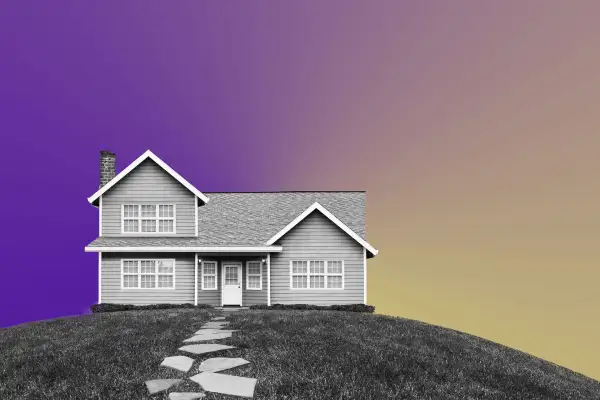Today's Best Mortgage and Refinance Rates: January 13, 2021 | Rates Up Again

Two-thirds of homeowners have either already moved or would consider moving to a different city or area within the next year, a new survey finds. Many buyers expect the option of working remotely to become more widespread even after the pandemic has passed.
Meanwhile, mortgage rates continued their upward trend on Tuesday.
Today's Mortgage Rates
The average interest rate on a 30-year fixed-rate mortgage was 3.284% on Tuesday — up from 3.181% on Monday.
| Mortgage Rate Chart |
| Loan type | Average Rate |
| 30-Year Fixed Loan | 3.284% |
| 15-Year Fixed Loan | 2.44% |
| 30-Year FHA Loan | 3.221% |
| 30-Year VA Loan | 3.259% |
| 30-Year Jumbo Loan | 3.836% |
Source: Money | Date: Jan. 12, 2021 | Rates assume a credit score of 700
Money's daily mortgage rates show the average rate offered by over 8,000 lenders across the United States the previous day. They reflect what a typical borrower with a 700 credit score might expect to pay for a home loan right now. The rates assume a 20% down payment and include discount points.
Freddie Mac's benchmark Primary Mortgage Market Survey put mortgage rates at 2.65% with 0.7 points paid for the week ending January 7, setting a new record low. That's 0.02 percentage points below last week. Rates set new record lows 16 times in 2020. This is the first all-time low set in 2021. The mortgage purchaser's weekly survey reflects borrowers who put 20% down on conforming loans and have excellent credit.
How do I get the best mortgage rates?
Mortgage rates vary from state-to-state. On Tuesday, borrowers in Illinois were quoted the lowest mortgage rates — at 3.204%. People looking for mortgages in Nevada saw the highest average rate at 3.392%.
Nationwide, borrowers with the highest credit scores, 740 and above, were quoted rates averaging 3.047%, while those with credit of 620 or below were shown rates of 4.424%.
You may be able to negotiate a better interest rate if you shop around or if you have other accounts with the lender. (To get started, take a look at Money's picks for the best mortgage lenders.) Currently, some lenders are hiking up advertised rates to keep demand in check, so you may be offered a lower rate if you reach out directly.
Today's Mortgage Refinance Rates
Money's survey also shows that the offered rate for a 30-year refinance for someone with a 740 credit score was 3.369% on Tuesday. In January 2020, the average mortgage rate (including fees) was around 3.8%.
| Mortgage Refinance Rate Chart |
| Loan type | Average Rate |
| 30-Year Fixed Loan | 3.369% |
| 15-Year Fixed Loan | 2.701% |
| 30-Year FHA Loan | 3.73% |
| 30-Year VA Loan | 3.732% |
| 30-Year Jumbo Loan | 3.659% |
Source: Money | Date: Jan. 12, 2021 | Rates assume a credit score of 740
What else is happening in the housing market today?
The relocation trend that started in 2020 as a result of the COVID-19 pandemic is expected to continue in 2021. One-third of homeowners polled in a recent Redfin survey have moved from one city to another during the last year. Another third said they would consider moving to a different area if given the opportunity to work remotely on a permanent basis.
“We haven’t seen the end of pandemic-driven relocation; there will be a second wave of migration this year as permanent remote workers are able to let lifestyle preferences and affordability rather than proximity to the office dictate where they live,” said Daryl Fairweather, Redfin's chief economist.
While the chance of relocating was attractive to most of the homeowners surveyed, most of them preferred to stay close to the cities or areas they were moving from.
Of those who had already moved, 30% relocated to an area less than 50 miles from their previous home. Of those who would consider a move in during the upcoming year, 23% preferred to stay within 50 miles of their current home.
More than 70% of the survey respondents expect remote work to continue even after the pandemic ends, leading to their willingness to move.
“Although some people will return to offices this year as vaccines roll out, many more workers will remain remote,” Fairweather said. “We expect even more homebuyers to be moving out of town this year as they solidify their remote-work plans.”
Fairweather also noted that the increase of new owners seeking more space in suburban and rural areas will push local governments to allow more construction to accommodate them. The relocation trend will also have an effect on large cities where real estate has traditionally been more expensive.
Cities like San Francisco and New York have seen a large number of homeowners move to more affordable suburban areas thanks to remote work. As a result, added Fairweather, "homes in those places may become a bit more affordable, a development that could eventually attract new residents or allow local renters to become homeowners.”
Quote of the Week
More great housing content from Money.
Denny Ceizyk, senior staff writer for mortgage marketplace LendingTree, on steps to take when preparing to buy a home:
Lenders want to see money that's been sitting in a bank for at least 60 days.”
For more read: 9 Steps to Take Now That Will Prepare You for Buying a Home in 2021.
Bottom line:
9 Steps to Take Now That Will Prepare You for Buying a Home in 2021
Current Mortgage Rates: 30-Year Mortgage Rates Hit a New Low
A Key Indicator Suggests Mortgage Rates' Epic Decline May Soon End
Rates are subject to change. All information provided here is accurate as of the publish date.
